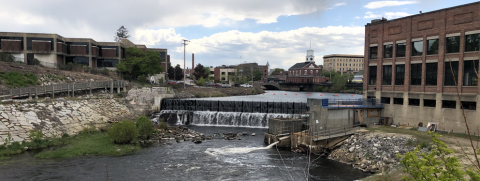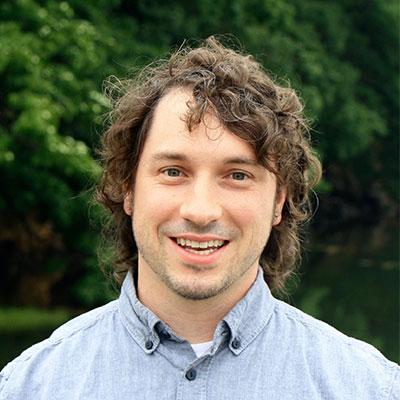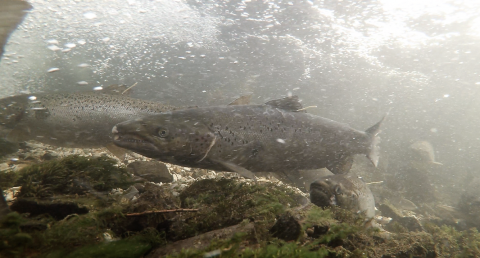Knauss Fellow Nick Anderson navigates fish passage policy

New Hampshire Sea Grant’s 2021 Knauss Fellow Nick Anderson is wrapping up his year working in the National Oceanographic and Atmospheric Administration’s (NOAA) Office of Habitat Conservation, where he worked as the National Fish Passage Coordination Specialist.
The Knauss Fellowship, wrapping up its 41st year, honors John A. Knauss, a founder of the National Sea Grant College Program, who formerly served as a NOAA administrator and dean of the University of Rhode Island’s Graduate School of Oceanography. Since 1979, over 1,400 early-career professionals have participated in this year-long paid fellowship that matches highly qualified graduate students with host offices in the legislative and executive branches of the U.S. government in Washington, D.C. Fellows work on national policy issues affecting ocean, coastal, and Great Lakes resources.
Nick received his master’s degree in the fall of 2020 from the University of New Hampshire’s Department of Natural Resources and the Environment where he studied novel monitoring techniques for eelgrass.
Though stationary plants may seem like a different world from migratory fish, Nick found similarities in working with fish passage at NOAA. “My master's work was in coastal ecology and seagrasses and a lot of that work is conservation and coastal management.” In fisheries, Nick explained, “you're bumping into a lot of similar topics.” Managing impacts of development and the use of river systems was a theme that ran parallel between both topics.

“Thinking about natural resources, they’re pretty similar between seagrass beds and migratory fish,” said Nick. “Fish and eelgrass are different, but big picture, the focus for both is creating and maintaining habitat necessary for both to survive and persist.”
As a Knauss Fellow, Nick was tasked with improving communication and coordination between regional offices and external partners to help enhance or increase fish passage in rivers where dams or other blockages may prevent sea-run migrations. A major focus was working with the National Hydropower Program, which aims specifically to make sure non-federal hydropower dams, licensed by the Federal Energy Regulatory Commission (FERC), have fishways or avenues for fish passage.
“I really like the team I work with, both at the headquarters level and also the people at regional offices working on these projects. They're amazing people!” said Nick. “It's been a bummer not to be able to meet them in person, but they're a great group. They know so much, they have a lot to teach, and they're a blast to work with.”
Working remotely, Nick helped lead the drafting of comments to FERC on financial assurance mechanisms for hydropower, which is a way to make sure that dams don’t become impediments to fish after a dam’s useful life. Derelict dams abandoned after becoming unprofitable can completely block any fish from making it upstream, and Nick helped an effort to require dams to provide ongoing financing that may help prevent this.
Nick was able to make two site visits to see fishways and dams on the Merrimack and Nashua rivers in Massachusetts and New Hampshire, among his other fellowship projects.
“It's been great! I tell [the Knauss office] all the time, it was the perfect fellowship for me.”
– Nick Anderson, 2021 Knauss Fellow
He also sat in on a review panel for an Atlantic salmon funding proposal in Maine and contributed to an internal website hosting resources for hydropower and fish passage practitioners to use in their work.

Nick said his biggest challenge at NOAA was finding time to work on everything that interested him, but he enjoyed the amount of learning he was able to do. “It must take people decades to absorb everything there is to learn, […] and you're still learning as you go. I've taken in everything I can, and my big takeaway is there's a so much more to learn.”
In the future, Nick hopes to continue working with policy and fish passage, but he also eyes a return to research. “I really enjoy this work and at this point, I’m trying to continue in this field. I do see myself at some point returning to research, and if it was focused on migratory fish ecology or fish passage, that would be the wonderful.”
As Nick told New Hampshire Sea Grant when he began his year a Knauss Fellow, fish ecology has been a longtime passion of his and being able to work in the field with people as passionate as he is has been a rewarding experience.
“It's been great! I tell [the Knauss office] all the time, it was the perfect fellowship for me.”
Click here to read a blog post Nick wrote for the National Sea Grant Office about his experience.